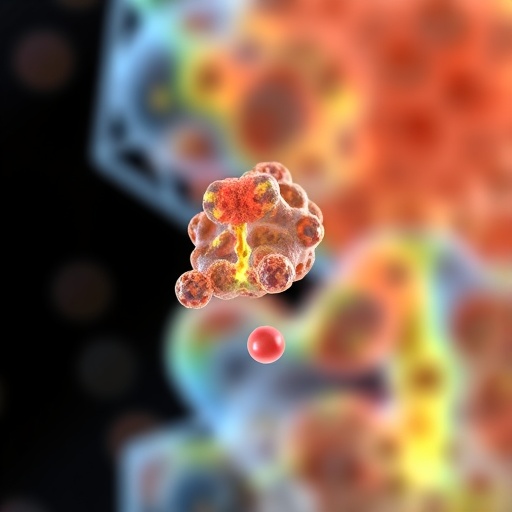In a groundbreaking study published in BMC Cancer, researchers have illuminated the pivotal role of α-L-fucosidase isoenzymes, FUCA1 and FUCA2, as prognostic markers in gliomas, a group of aggressive brain tumors. Gliomas, particularly lethal in their most malignant form known as glioblastomas, have long posed a challenge for effective diagnosis and treatment. This comprehensive investigation melds vast genomic data with experimental validation, revealing a new dimension in understanding glioma biology and patient prognosis.
Gliomas derive from glial cells in the central nervous system and present a broad clinical spectrum ranging from low-grade tumors with relatively slow progression to highly invasive glioblastomas with dire outcomes. The study focuses on the molecular underpinnings that contribute to glioma progression, using α-L-fucosidase enzymes as a lens. FUCA1 and FUCA2 catalyze the hydrolysis of fucose-containing glycoconjugates and have been implicated in various cancers, yet their integrated effects in glioma pathogenicity remained elusive until now.
Capitalizing on massive data repositories including The Cancer Genome Atlas (TCGA), the Chinese Glioma Genome Atlas (CGGA), Gene Expression Omnibus (GEO), and Open GWAS, the research team conducted an in-depth genomic and epigenetic analysis. This robust cross-validation approach allowed them to identify significant associations between FUCA isozyme expression levels and glioma patient outcomes. Of particular interest were low-grade gliomas (LGG), known for their complex clinical relationship with glioblastomas, shedding new light on tumor evolution.
The researchers discovered that glioma tumors demonstrating overexpression of FUCA1 and FUCA2 were also characterized by hypomethylation of these genes — an epigenetic hallmark often associated with increased gene activity. This aberrant upregulation correlated with more aggressive tumor features, including the presence of IDH wild-type status and the absence of 1p/19q chromosomal codeletions, molecular traits historically linked with poor prognosis.
Another critical finding centered on the immune microenvironment of gliomas bearing high FUCA1 and FUCA2 expression. These tumors exhibited marked increases in macrophage infiltration, which are immune cells known to contribute to tumor immunosuppression and progression. Furthermore, a strong correlation with diverse immune-related gene networks suggested these isoenzymes may modulate the immune landscape, thus influencing tumor behavior and patient response to immunotherapies.
To translate these insights into clinical utility, the team developed the AFURS (α-L-fucosidase-related score), a prognostic model that integrates FUCA expression with clinical data. Trained on the TCGA cohort incorporating both LGG and glioblastoma samples, and subsequently validated on the CGGA mixed glioma cohort, the model demonstrated robust predictive power for overall patient survival. Notably, exploratory analyses suggested AFURS could potentially forecast responses to emerging immunotherapeutic interventions, heralding personalized treatment strategies.
Bridging bioinformatics with functional biology, the study employed in vitro experimentation to directly test FUCA1 and FUCA2’s impact on glioma cell behaviors. RNA interference-mediated silencing of these genes resulted in significant reductions in cell migration, invasion, and proliferation while enhancing apoptotic processes. These effects underscore the isoenzymes’ role not only as biomarkers but potentially as therapeutic targets to restrain glioma aggressiveness.
Moreover, the silencing of FUCA2 specifically disrupted the NF-kB signaling pathway, a critical regulator of immune responses, inflammation, and cancer cell survival. This mechanistic insight provides a molecular explanation for the observed interplay between FUCA2, tumor progression, and immune modulation, opening avenues for targeted molecular therapies that intersect with immune checkpoint pathways.
Within the broader context of glioma research, this study signifies a paradigm shift by integrating epigenetic modification, immune microenvironment, and cellular behavior through the lens of α-L-fucosidase isoenzymes. These findings deepen our molecular understanding and could catalyze the development of diagnostic tools and novel therapeutic approaches tailored to the glioma subtype and molecular profile.
Experts in the oncology community have lauded the meticulousness of this work, which combines comprehensive genomic analyses with tangible functional experiments. Such an approach ensures that the prognostic markers identified are not merely correlative but mechanistically linked to glioma pathophysiology, significantly enhancing their translational potential.
Considering the notorious heterogeneity of gliomas, the identification of reliable, consistent prognostic markers has been a bottleneck in advancing patient care. FUCA1 and FUCA2’s dual role as indicators of tumor behavior and modulators of the tumor milieu adds a valuable layer to existing molecular classification systems, encouraging their adoption in future clinical trials and diagnostic pipelines.
Importantly, the study’s indication of FUCA expression levels’ association with immune infiltration and response suggests their possible utility in optimizing immunotherapy strategies — a burgeoning frontier in neuro-oncology. By pinpointing patients most likely to benefit from immunomodulatory drugs, FUCA-based assessment could refine treatment delivery and improve outcomes.
However, researchers caution that while these findings are compelling, further clinical validation in larger, diverse populations is required before routine clinical implementation. Future studies will also explore combination therapies targeting FUCA-mediated pathways alongside standard chemotherapy and radiation to potentiate treatment efficacy.
Summarily, this cutting-edge investigation deftly addresses gaps in glioma understanding by highlighting the prognostic significance of α-L-fucosidase isoenzymes, FUCA1 and FUCA2, while elucidating their biological functions. By linking molecular alterations to clinical features and immune responses, it paves the way for next-generation diagnostic and therapeutic innovations in a field urgently needing breakthroughs.
As glioma patients and clinicians alike await improved prognostic accuracy and more targeted interventions, this work stands at the vanguard of translating molecular discoveries into tangible clinical benefits, promising to reshape how these devastating brain tumors are understood and managed.
To access the full study and in-depth data, readers can refer to the 2025 BMC Cancer volume 25, article number 1511, via DOI: 10.1186/s12885-025-15049-0.
Subject of Research:
The role of α-L-fucosidase isoenzymes (FUCA1 and FUCA2) as prognostic markers and biological modulators in gliomas, focusing on their genetic, epigenetic, and immunological impacts.
Article Title:
α-L-fucosidase isoenzymes (FUCA1/FUCA2) as prognostic markers in gliomas: a comprehensive study
Article References:
Zuo, C., Liu, Y., Wang, Z. et al. α-L-fucosidase isoenzymes (FUCA1/FUCA2) as prognostic markers in gliomas: a comprehensive study. BMC Cancer 25, 1511 (2025). https://doi.org/10.1186/s12885-025-15049-0
Image Credits:
Scienmag.com




